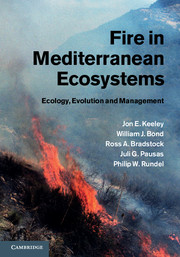Book contents
- Frontmatter
- Contents
- Section I Introduction
- Section II Regional patterns
- Section III Comparative Ecology, Evolution and Management
- 9 Fire-adaptive Trait Evolution
- 10 Fire and the Origins of Mediterranean-type Vegetation
- 11 Plant Diversity and Fire
- 12 Alien Species and Fire
- 13 Fire Management of Mediterranean Landscapes
- 14 Climate, Fire and Geology in the Convergence of Mediterranean-type Climate Ecosystems
- References
- Index
13 - Fire Management of Mediterranean Landscapes
from Section III - Comparative Ecology, Evolution and Management
Published online by Cambridge University Press: 05 January 2012
- Frontmatter
- Contents
- Section I Introduction
- Section II Regional patterns
- Section III Comparative Ecology, Evolution and Management
- 9 Fire-adaptive Trait Evolution
- 10 Fire and the Origins of Mediterranean-type Vegetation
- 11 Plant Diversity and Fire
- 12 Alien Species and Fire
- 13 Fire Management of Mediterranean Landscapes
- 14 Climate, Fire and Geology in the Convergence of Mediterranean-type Climate Ecosystems
- References
- Index
Summary
The hazardous mediterranean climate, highly flammable vegetation, and rugged terrain, all important elements of fire behavior, become problems only in the presence of people. People recreate and build homes in the mediterranean wildlands because of the delightful climate and will continue to do so as long as space is available. People start most fires, and their mere presence tends to warp fire suppression strategies because fire agencies must protect lives and property threatened by fires rather than “back off” and build fire lines around fire perimeters.
Carl C. Wilson (1979a), Chief of Division of Forest and Fire Research, USFS/Pacific Southwest Forest and Range Experiment StationHuman presence in mediterranean-type climate (MTC) regions has differed markedly in the length of human occupation; however, there are remarkable similarities in how early inhabitants altered fire regimes and how modern societies deal with the fire hazard. Here we draw on the history of human impacts outlined in the regional reviews (see Chapters 4–8), the problems created by nineteenth and twentieth century management practices, and conclude with twenty-first century problems and future options. As discussed throughout this book, MTC ecosystems are highly fire adapted but, as illustrated here, contemporary societies have not fully adapted to balancing fire hazard risk and resource needs on these landscapes.
Early Human Fire Use and Impacts
Fire has been a widely utilized management tool throughout the history of humankind (Pyne 1995). Early hunter–gatherers utilized fire to manage for plant and animal resources. Fire also played an important role in early domestication of crops as clearing off woody or other perennial vegetation would have required fire on many landscapes. With domestication of livestock it was an important tool for increasing forage.
- Type
- Chapter
- Information
- Fire in Mediterranean EcosystemsEcology, Evolution and Management, pp. 349 - 387Publisher: Cambridge University PressPrint publication year: 2011



